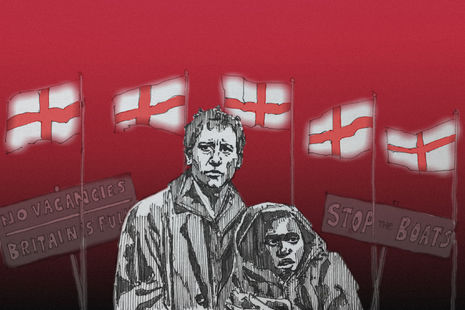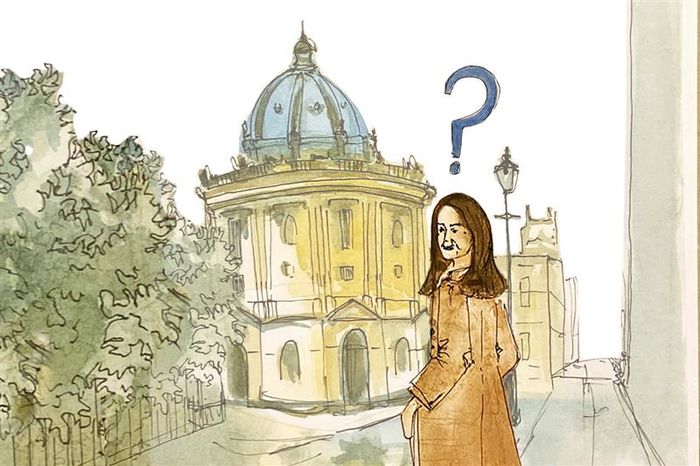Children of Men and the Britain we were warned about
Max La Bouchardiere examines how and why Alfonso Cuarón’s Children of Men still feels disturbingly familiar, two decades later

We are just over a year away from 2027 – the dystopian future Alfonso Cuarón imagined in Children of Men (2006), marked by mass infertility and authoritarianism in Britain. There were no aliens, no zombies, no AI uprisings. Unlike archetypal Hollywood apocalypses, Cuarón’s metaphor of infertility demonstrates that the most likely catastrophes are both progressive and entirely human. There is no single cataclysm – only a continual slide into societal devastation. Nearly 20 years on, Children of Men resonates less as speculation and more as an uncomfortable diagnostic. Our failure to address worsening socio-economic issues has only drawn us closer to Cuarón’s Britain.
Just as we approach two decades since the film, its narrative begins 20 years after the first cases of human sterility. At its opening, when the youngest person on Earth is killed at age 18, humanity seems resigned to a feeling of irreversibility.
Theo Faron (Clive Owen), the film’s reluctant protagonist, initially embodies this defeatism. For him, it is beside the point whether the quasi-mythic Human Project could cure what is endemic. Despite rumours of this scientific enclave working to reverse infertility, Theo believes the world already “went to shit.” After decades of crisis, his retreat from political action is total: “I don’t talk politics.” “That’s all you ever used to do,” his estranged wife Julian (Julianne Moore) retorts.
Theo’s break with activism for a bureaucratic career resonates with contemporary political disillusionment. Socio-economic inequality has widened within countries, climate change suggests the Earth is likely “doomed,” colonialism and genocide remain modern tragedies, and anti-migrant rhetoric has accompanied a revitalised far-right. The pressures of these seemingly irreversible crises have fostered cynical impotence.
Forecasting this political disillusionment, Cuarón renders the film’s climate of despair through darkly comic contrasts. The state distributes antidepressants and allows government-assisted suicide, yet cannabis remains a criminal offence. Children of Men shows that an authoritarian Britain remains committed to contradiction. The privileged care only about state violence when art is harmed: Theo’s wealthy cousin (Danny Huston) despairs that “thing in Madrid”, implied to have killed civilians, “was a real blow to art.” The most fortunate can ignore that art will have no importance when the rest of humanity dies out.
“Children of Men shows that an authoritarian Britain remains committed to contradiction”
Meanwhile, mass infertility has irrevocably reduced the labouring class in Cuarón’s Britain. Yet rather than exploit their labour power, the state’s hatred of asylum seekers drives them to cages for their deportation or execution. Such extreme anti-immigration policies are depicted by Cuarón with tacit support and not disillusionment. Today, this forewarns the ever-increasing violence against scapegoated minorities, intensified when governments sheepishly bow to moral panics. Echoing rhetoric like “strangers” and “illegal immigrants”, Cuarón shows how dehumanisation is normalised through terms like “fugees”. Conversely, those like Julian – pursuing peaceful direct action for the most systematically abused – are labelled “terrorists”.
Of course, it would be incorrect to view Children of Men as a prophecy or an exact mirror of contemporary Britain. Cuarón’s film must be contextualised as an incisive critique of the democratic mirage wrought by the War on Terror, the nihilism produced by a politics of exception and emergency, and the social conservatism of Blairism.
Yet it is Cuarón’s cumulative portrayal of dystopia (via mass infertility) that reflects how our political system has failed to reverse its deep-seated issues. For Cuarón, this political thriller was a dramatisation of the early 2000s, grounded in a desaturated palette and drawn-out takes. Two decades on, Children of Men shows how Britain has merely continued along the path it critiqued.
“Children of Men shows how Britain has merely continued along the path it critiqued”
The untrammelled austerity of the 2010s, beginning under Cameron-Osborne – and Labour’s ongoing equivocation around such – was unforeseen by Cuarón, but captures the predicted path towards an authoritarian Britain. Under austerity’s violence, the confluence of neoliberal ideology and neoconservativism became explicit. Contrary to neoliberal promises, the modern British state was not diminished – only welfare and public services. Bidding farewell to our libraries and youth clubs, police powers and the state remained ever empowered and supported.
At the same time, Children of Men suggests that, even under a more severely repressive state, billboards continue advertising, banks persist, and global chain stores operate in front of the homeless and amid pollution. An authoritarian Britain would thus resemble a vassal state to capital, punctuated by rabid cultural anxieties – such as marijuana and migration – and overcompensating through securitisation.
The drift toward such a Britain has crystallised in an emboldened far right. While Children of Men parallels contemporary rhetoric on asylum seekers – and the horrors in Palestine are no improvement on his mirror to Abu Ghraib – Cuarón’s focus on Britain’s left-coded activists is the clearest sign he made it 20 years ago. Unlike the violent ‘Fishes’, or Theo’s socio-political struggle, it is far-right extremists who mobilise today.
In this context, 20 years of infertility in Children of Men is not a mere plot device but a metaphorical diagnostic. The far right did not emerge overnight – it has steadily proliferated over recent decades. Enabled by a continued refusal to address growing socio-economic issues, they have offered easy (racist) solutions while seeking to amplify the repression and social retrenchment normalised under neoliberal and neoconservative rule. This makes it difficult for leftists and the working class to be the hopeful Theo Faron – and not his initial, cynical self – but Theo’s eventual zeal, struggle, and refusal to capitulate are what is needed before Children of Men scarcely resembles fiction.
 News / Cambridge academics sign open letter criticising research funding changes22 February 2026
News / Cambridge academics sign open letter criticising research funding changes22 February 2026 News / University Council rescinds University Centre membership20 February 2026
News / University Council rescinds University Centre membership20 February 2026 News / Supporters protest potential vet school closure22 February 2026
News / Supporters protest potential vet school closure22 February 2026 News / Hundreds of Cambridge academics demand vote on fate of vet course20 February 2026
News / Hundreds of Cambridge academics demand vote on fate of vet course20 February 2026 Comment / A tongue-in-cheek petition for gowned exams at Cambridge 21 February 2026
Comment / A tongue-in-cheek petition for gowned exams at Cambridge 21 February 2026








